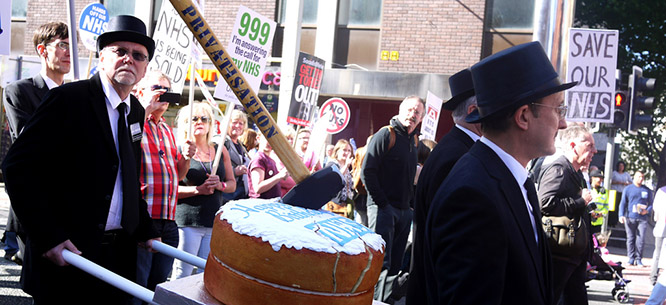The Twilight of the British Public Health System?
The Twilight of the British Public Health System?

Less than two years after the fall of Nazi Germany, a bankrupt Britain—reeling from the most destructive war in history and living under conditions of stark austerity—elected to create an extraordinary system of universal health care, the National Health Service (NHS). Aneurin Bevan, the Labour Party minister of health who played a crucial role in its creation, famously remarked that the NHS would “last as long as there are folk left with the faith to fight for it.” Subsequent developments, it seems, have put his challenge to the test.
In 2012 David Cameron’s Conservative-led government passed the Health and Social Care Act, legislation that opens the NHS to privatization like never before. Building on a series of neoliberal health care “reforms” dating back to the Thatcher era and coinciding with the dictates of our age of austerity, Cameron’s law could very well mark the beginning of a slow end for the English NHS (the largely autonomous Scottish NHS has been going in a much different direction). To be clear, the law is not meant to privatize the system entirely; after all, caring for a whole population—including its poor, elderly, and chronically ill—is messy, complex, and frequently unprofitable, and so historically uninteresting from a commercial perspective. Instead, the law will allow—indeed, it will require—the competitive “tendering” of health care services to corporate providers, which can then pick off the profitable parts, bit by bit. Its provisions end the fundamental legal requirement that the secretary of state ensure comprehensive care throughout the country. The law encourages NHS facilities to provide uncovered services for cash, while at the same time reductions in funding force cuts in covered services. The law may even ultimately open new opportunities for fees to be charged at the point of service, in direct contradiction of the service’s founding principles.
The Health and Social Care Act, in other words, will not end the NHS. It will fragment and commercialize it, while the demands of austerity will continue to stretch it thin. At some point, though the NHS will continue to exist, we may no longer be able to recognize it.
I. 1948–1980: “It Is Not a Charity”
Shortly after the NHS went into effect in 1948, a leaflet was distributed to all homes to explain the function and purpose of the new system:
It will provide you with all medical, dental, and nursing care. Everyone—rich or poor, man, woman or child—can use it or any part of it. There are no charges, except for a few special items. There are no insurance qualifications. But it is not a charity. You are all paying for it, mainly as taxpayers, and it will relieve your money worries in times of illness.
Though its organizational structure may have been considerably complex, such a simple and straightforward summary spoke to the truly radical—and f...
Subscribe now to read the full article
Online OnlyFor just $19.95 a year, get access to new issues and decades' worth of archives on our site.
|
Print + OnlineFor $35 a year, get new issues delivered to your door and access to our full online archives.
|






